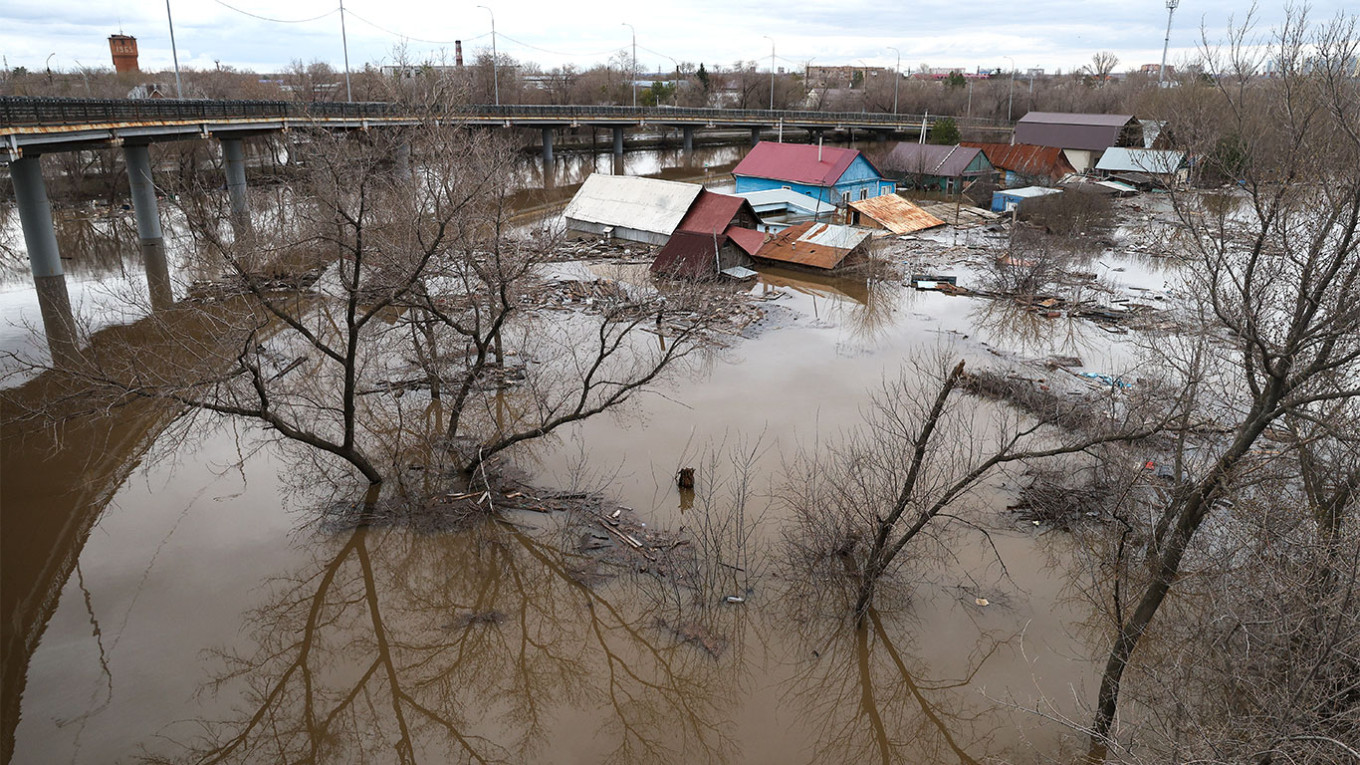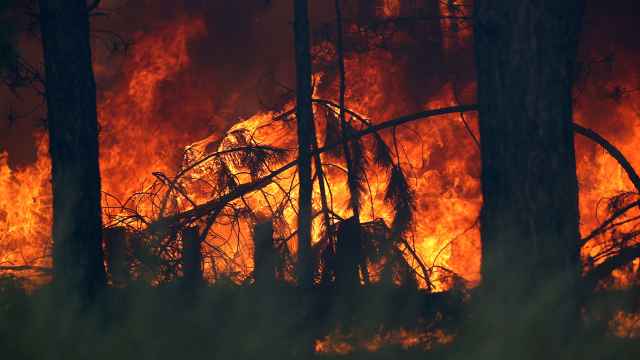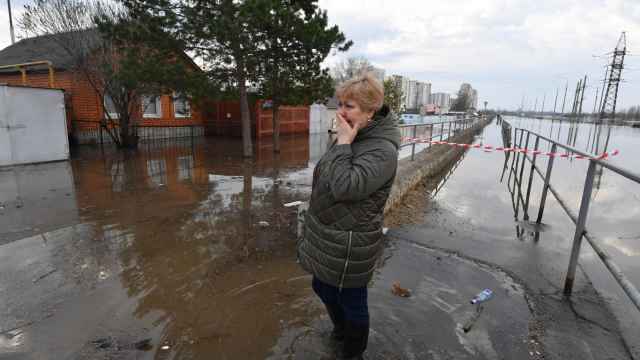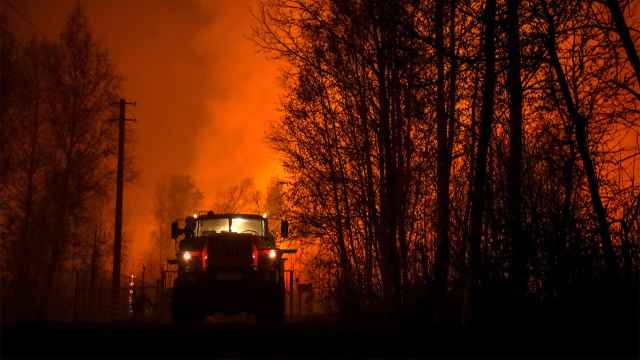When the water started rising sharply in Orenburg, a regional capital near Russia’s border with Kazakhstan, Veronika realized that a “gigantic tragedy” was unfolding before her eyes.
“It was such a terrible, nerve-wracking situation because the water kept rising and rising,” Orenburg resident Veronika told The Moscow Times. “Every day you wake up, scroll through the news feed, and all of Orenburg is occupied by checking the level of the Ural River every hour.”
Since the river started flooding the city on April 5, breaking the record set in 1942 a week later, Orenburg residents have been gripped by anxiety, said Veronika, who asked to change her name due to the potential risks of speaking to a media outlet labeled as a “foreign agent” by Russia.
The many cottages and high-rise buildings built along the banks of the Ural in recent decades all succumbed to the “terribly powerful” stream of water that overwhelmed city dams, she said.
“My acquaintances just moved into their home in December, and now it's completely submerged. The water just started rising suddenly, and they only managed to salvage a minimal amount of belongings. There are countless stories like this.”
Russia's flood crisis this month has seen entire settlements plunged underwater and thousands evacuated in regions spanning from the Urals and western Siberia to the Far East Khabarovsk region.
While Russia regularly sees springtime flooding, this year’s floods were exacerbated by the sudden onset of warm weather following a winter that had brought above-average snowfall, experts said.
The authorities' response could serve as a test of the country’s readiness for the climate crisis, which scientists say will bring more frequent and destructive extreme weather events as it intensifies.
Without the resources or political will to pursue a sound policy of climate adaptation, experts warn that this spring’s disaster will become the new norm.
'Battle for a dam'
At its peak last week, the floods submerged almost 18,000 homes and 32,600 land plots in 210 Russian towns and cities, with the Kurgan and Orenburg regions hit the hardest. At least seven people died in the Orenburg region as a result of the flooding, the IStories investigative news outlet reported.
Flood-stricken regions entered a round-the-clock state of emergency that saw both an official response and volunteer efforts.
"The whole city came together to build dams out of sandbags to protect the city," Anna, a resident of Kurgan, the regional capital of the Kurgan region in western Siberia, told The Moscow Times.
The region’s flooding was its worst in 75 years, submerging nearly 2,000 homes and forcing over 15,000 people to evacuate.
Veronika from Orenburg described a “battle for a dam” in her city as locals, volunteers and emergency services worked day and night to build up the dam using gravel, soil and clay to prevent the flooding from spreading.
People in many regions, not counting on officials’ help, resorted to building dams themselves, but in some cases were asked by officials to dismantle them under the threat of fines.
Russia’s Natural Resources Ministry later said that the construction of dams should be based on engineering calculations and that self-built dams are illegal.
Beyond the makeshift dams, many people have tried to help by rescuing stranded people and animals on dinghies, organizing temporary shelters or providing humanitarian aid.
"People help each other in every possible way. Some with money, some with hands, some with goods. We constantly deliver essential products to these temporary shelters … so people can wash and have something for themselves in this temporary home,” Veronika said.
Flooded areas also received help from elsewhere in Russia. Authorities from Moscow visited the affected zones and supervised rescue efforts, while regional governments delivered food, water and medications.
Refused to be saved
In the Kurgan region, authorities issued warnings and launched evacuation well in advance, Anna said. They also vaccinated residents of flood-prone areas against the hepatitis A virus.
"All services are operating in emergency mode. The sirens have been sounding for several days," Anna told The Moscow Times last week.
However, many refused to evacuate despite Governor Vadim Shumkov’s repeated calls to citizens on his Telegram channel.
“Thousands of people … are working tirelessly. However, they cannot be fully effective without your help. … Do not hide, do not run away from the evacuation groups and do not return after they leave,” Shumkov said last week as the flood waters rapidly approached Kurgan.
“Fellow citizens, we cannot rely on chance or assume that past floods were manageable. This is not just a flood, it is a real threat!” he added.
At first, many residents assumed the city administration was exaggerating the risk, only realizing later that the situation was serious, Anna said.
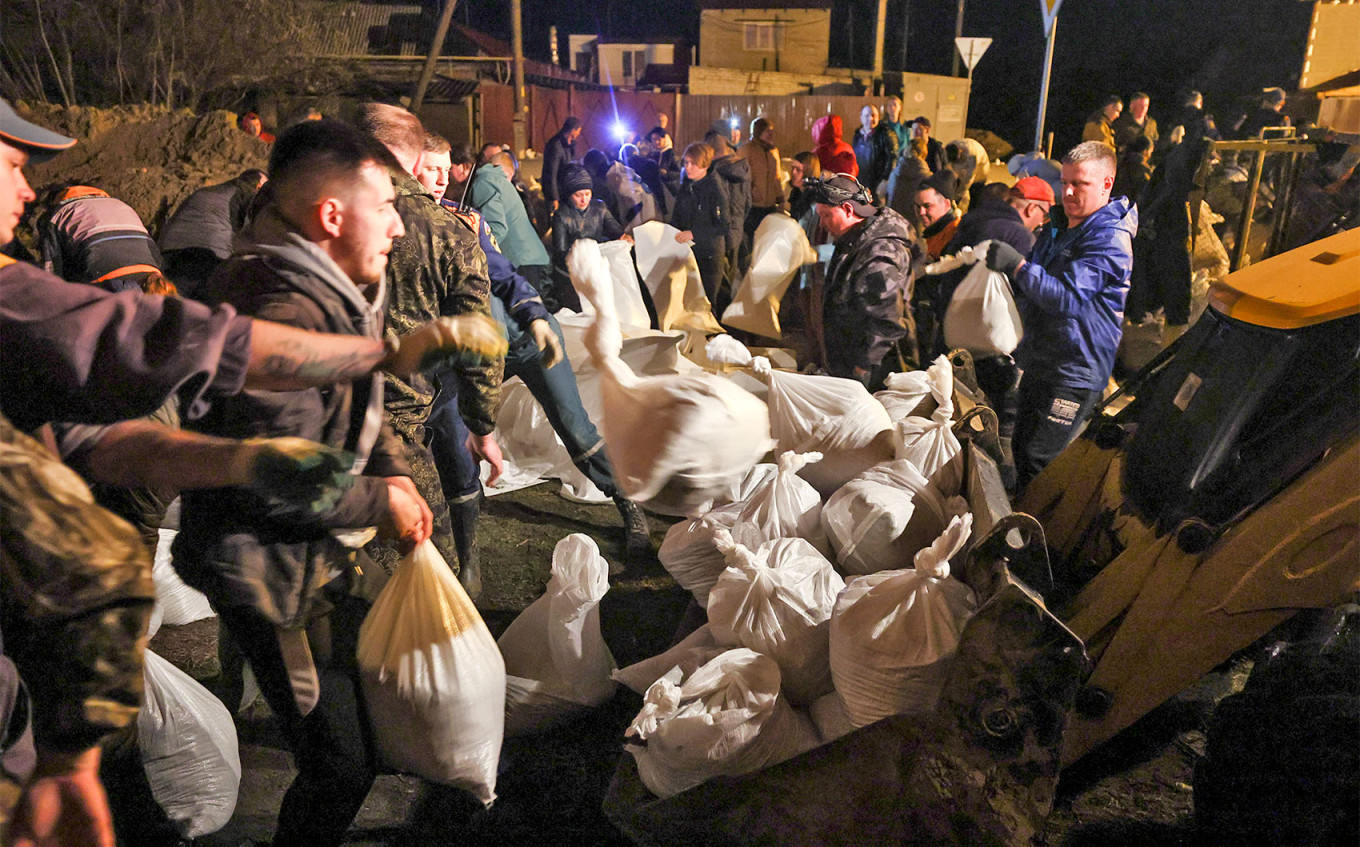
In the Orenburg region, people feared looters and scams after unknown individuals posing as members of a trusted volunteer organization stole people’s boats, said Veronika.
Opinions of the government's response to the disaster varied.
Anna said she believes that the Kurgan authorities effectively managed the crisis, as “everything was announced in advance, everyone was organized, and all information was provided.”
“We currently have a good governor. He is genuinely doing something for the region,” Anna said.
Locals in the Orenburg region were less satisfied. In Orsk, one of the worst-hit cities in the region, residents took to the streets on April 8 to demand proper compensation. Two weeks later, a local woman lambasted Orsk Mayor Vasily Kozupitsa for the lack of adequate assistance during his meeting with residents, a video circulating online showed.
“[We] can't reach anyone, no one responds — and you sit there, everything's fine for you. Have some conscience at last! You're in your white shirt while we've been struggling for two weeks without money, without anything,” the unidentified woman said.
Kozupitsa pledged compensation of 100,000 rubles ($1,080) to each affected individual in Orsk.
The Orenburg region government provides 100,000 rubles to those who completely lost their property. People injured by the floods qualify for payments between 200,000 ($2,160) and 400,000 rubles ($4,300), while families of the deceased can count on 1 million rubles ($10,800).
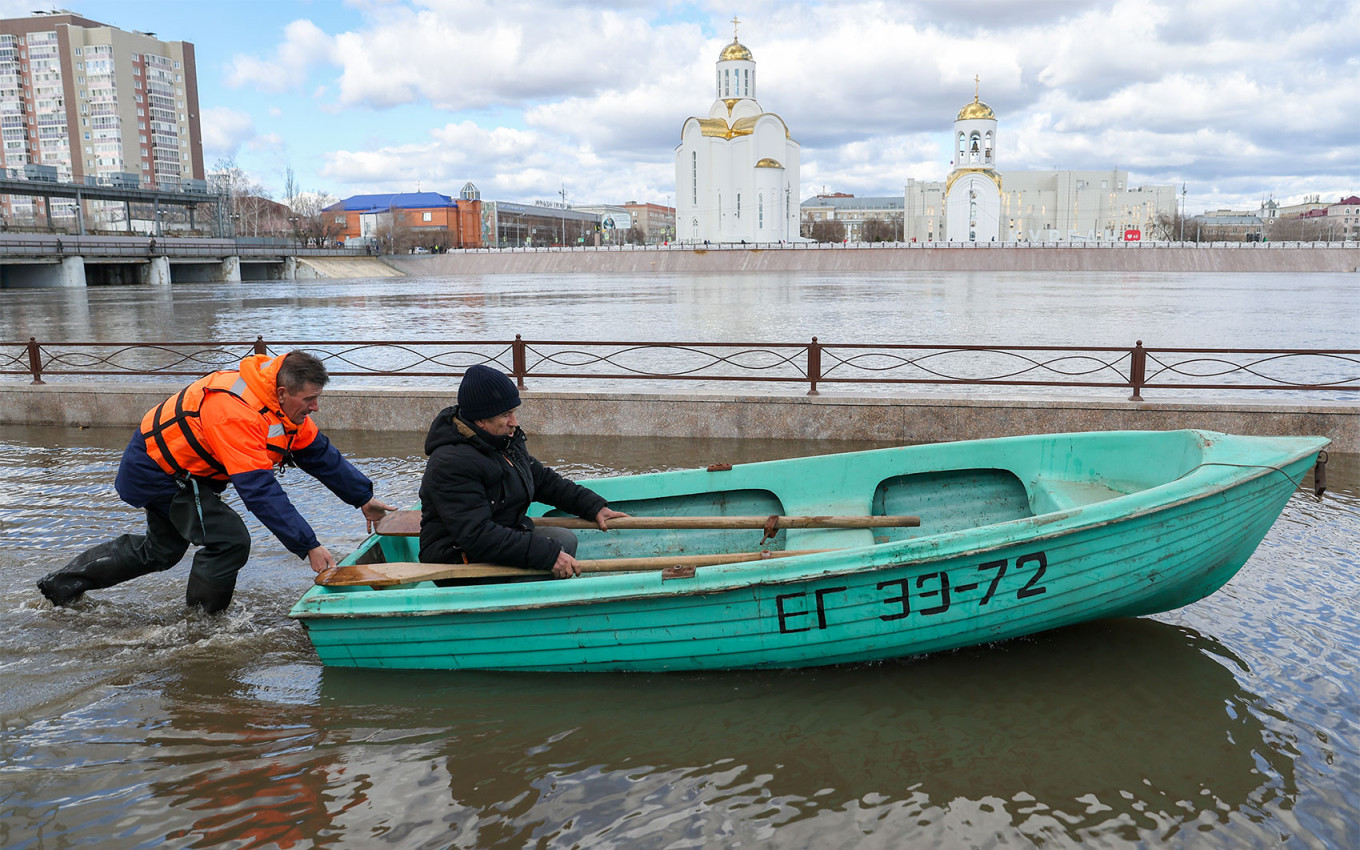
In comparison, authorities in some Russian regions offer a one-time payment of 400,000 or 700,000 rubles for signing a military contract — with the Krasnodar region promising 1 million rubles for military sign-ups.
As of Wednesday, 46,400 residents of the Orenburg region have received payments.
President Vladimir Putin slammed regional leaders on Wednesday for their handling of the financial aid for flood victims, noting that the number of people who applied for compensation in the Orenburg region was nine times higher than those who have already received it.
Orenburg region Governor Denis Pasler said this was because many people who applied lived in non-affected areas.
While Veronika acknowledged that regions likely lack the resources to adequately prepare for disasters like the Orenburg region floods, she has many questions for the authorities — in particular about future financial support for the flood victims and whether people should even keep living in the affected areas.
What’s next
After the flood waters subside and the media coverage wanes, thousands of homes will still be left in ruins. Many Russians lack the financial means to rebuild their houses, making continuous financial support from the state vital — but this aid is not guaranteed.
Scientists also predict that floods will become increasingly frequent and severe in a warming world, even though it might not be possible to immediately link a given disaster to climate change.
More frequent natural disasters can drain individual capacities for adaptation, both financially and psychologically. Once one restores their house and mental health after a flood, the next incident could be just around the corner — putting them back at square one.
Yet Veronika and Anna said climate change is not an issue that is normally discussed in their communities.
In addition to taking immediate steps to prevent future catastrophes — such as revising urban planning and dam construction regulations — Russia will need to constantly adapt to worsening conditions as global climate change intensifies, a Russian climate expert told The Moscow Times.
The expert requested anonymity due to their affiliation with a group targeted by the Russian authorities.
Currently, there is no strong public demand for policymakers to address climate change like there is for economic, crime and nuclear safety issues, the expert said.
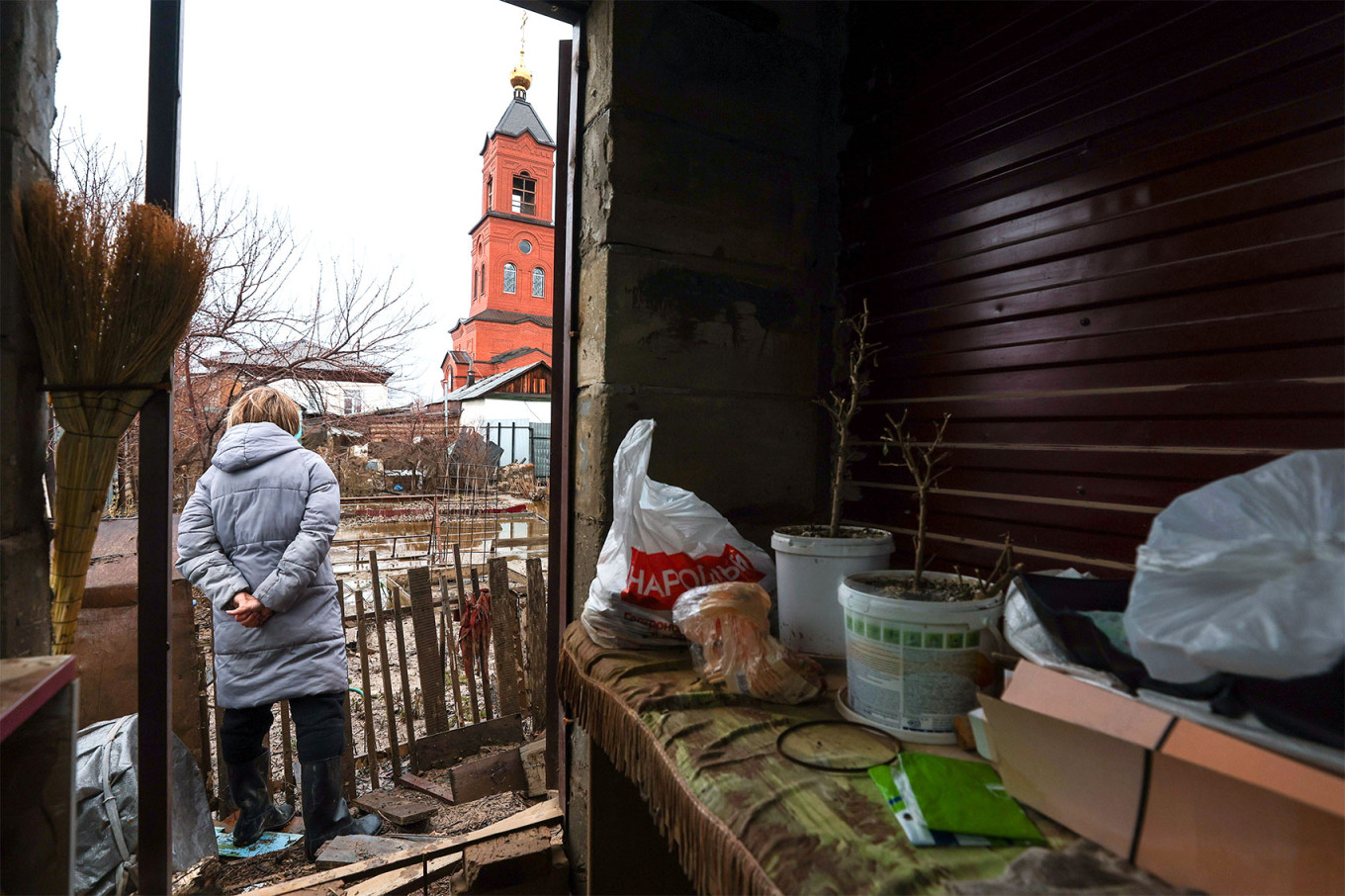
“We need to start by honestly talking about the climate crisis and by stopping all these fake stories about climate weapons, climate antennas in Alaska, 'LGBT sins' — there's no end to what [public discussion] blames for the floods and wildfires,” the expert said.
“Instead, we need to explain it from the perspective of the scientific consensus [on human-made climate change].”
The expert added that businesses in Russia should take preventive steps like avoiding building in flood-prone areas, which he said should also be prohibited by the government.
Future floods are likely to set new precedents of damage given that Russia currently lacks viable climate adaptation plans, said Vladimir Slivyak, co-chairman of the environmental group Ecodefense.
"Adaptation plans cannot prevent disasters but can significantly reduce their consequences. For instance, such plans could involve inspecting dams in regions to determine where reinforcement is necessary,” Slivyak told The Moscow Times.
However, Moscow is not interested in climate adaptation for now, Slivyak said.
"In a large country like Russia, adaptation is very expensive. But the money spent on the war would be enough,” he said.
“However, this is not a government priority, so changes are not expected yet, and the [Russian] population will continue to suffer from climate change."
A Message from The Moscow Times:
Dear readers,
We are facing unprecedented challenges. Russia's Prosecutor General's Office has designated The Moscow Times as an "undesirable" organization, criminalizing our work and putting our staff at risk of prosecution. This follows our earlier unjust labeling as a "foreign agent."
These actions are direct attempts to silence independent journalism in Russia. The authorities claim our work "discredits the decisions of the Russian leadership." We see things differently: we strive to provide accurate, unbiased reporting on Russia.
We, the journalists of The Moscow Times, refuse to be silenced. But to continue our work, we need your help.
Your support, no matter how small, makes a world of difference. If you can, please support us monthly starting from just $2. It's quick to set up, and every contribution makes a significant impact.
By supporting The Moscow Times, you're defending open, independent journalism in the face of repression. Thank you for standing with us.
Remind me later.


